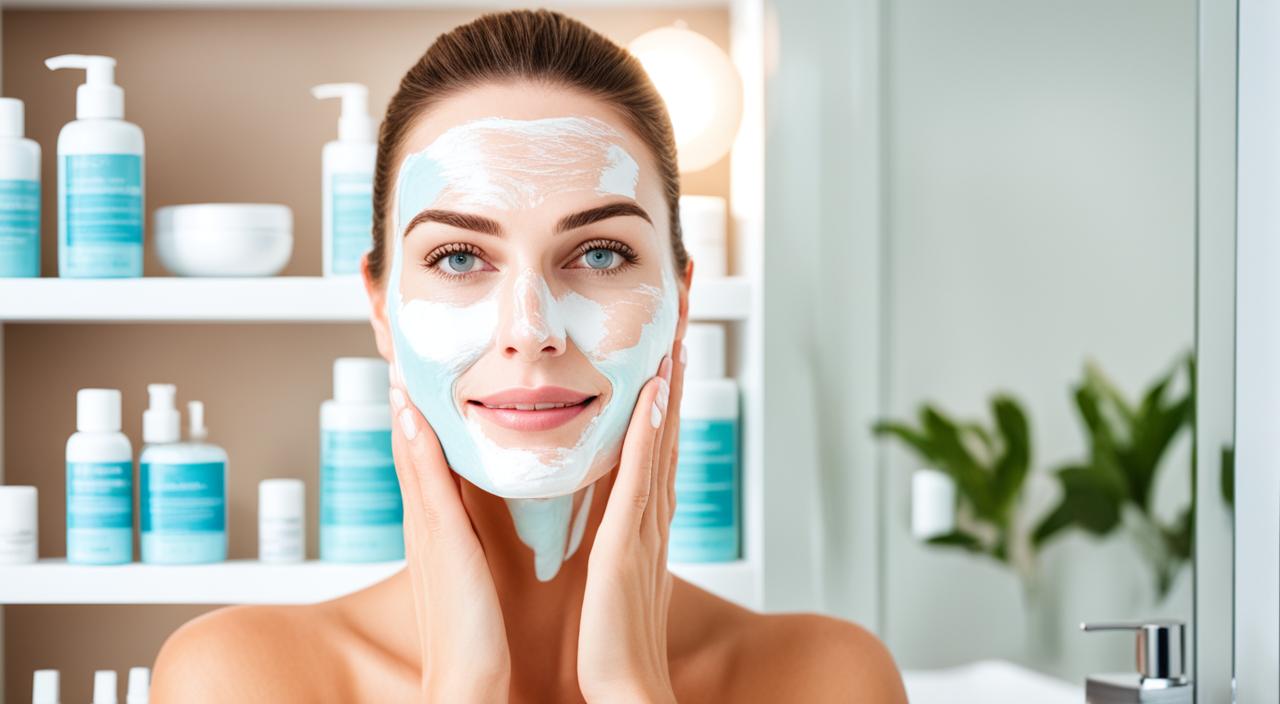What Are The Key Steps In A Morning Skincare Routine?
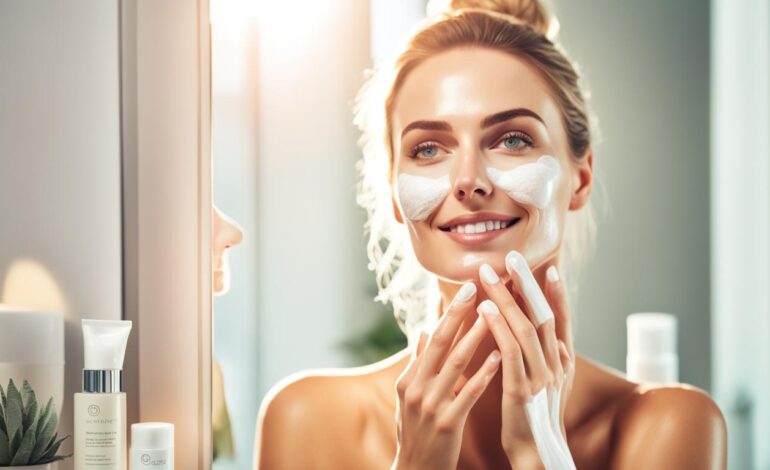
Your morning skincare routine is essential for preparing your skin for the day ahead. It helps protect your skin from UV exposure, high-energy light, and environmental pollutants. The key steps in a morning skincare routine include cleansing, exfoliating, toning, applying serums, moisturizing, and using sunscreen. The products and techniques you choose will depend on your skin type and concerns.
Key Takeaways:
- A morning skincare routine is important for protecting the skin from harmful elements.
- The main steps in a morning skincare routine are cleansing, exfoliating, toning, applying serums, moisturizing, and using sunscreen.
- Customize your routine based on your skin type and concerns.
- Consistency is key for achieving optimal results.
- Consult with a dermatologist to determine the best routine for your skin type.
The Importance of Cleansing in the Morning
In your morning skincare routine, cleansing plays a vital role in maintaining healthy and radiant skin. Cleansing your face in the morning is important to remove dirt, oil, and bacteria that may have built up overnight. By effectively washing your face, you can decrease your bacterial colony count and leave your skin feeling fresh and clean for the day ahead.
But why is cleansing so crucial in the morning?
During the night, your skin works to repair and regenerate itself. As a result, it’s common to wake up with oil, sweat, and dead skin cells on the surface of your skin. Cleansing in the morning helps to eliminate these impurities, preventing them from clogging your pores and causing breakouts. Additionally, washing your face in the morning helps to prepare your skin for the application of other skincare products, allowing them to penetrate deeper for maximum effectiveness.
When it comes to choosing a cleanser for your morning routine, it’s essential to consider your skin type. If you have sensitive or dry skin, opt for a gentle, milky cleanser that won’t strip away natural oils. On the other hand, if you have oily or acne-prone skin, a medicated cleanser with ingredients like salicylic acid or tea tree oil can help control excess sebum and prevent breakouts.
Remember: a thorough cleansing routine in the morning sets the stage for the rest of your skincare regimen, ensuring that your skin stays healthy, glowing, and ready to face the day ahead.
The Benefits of Exfoliating in the Morning
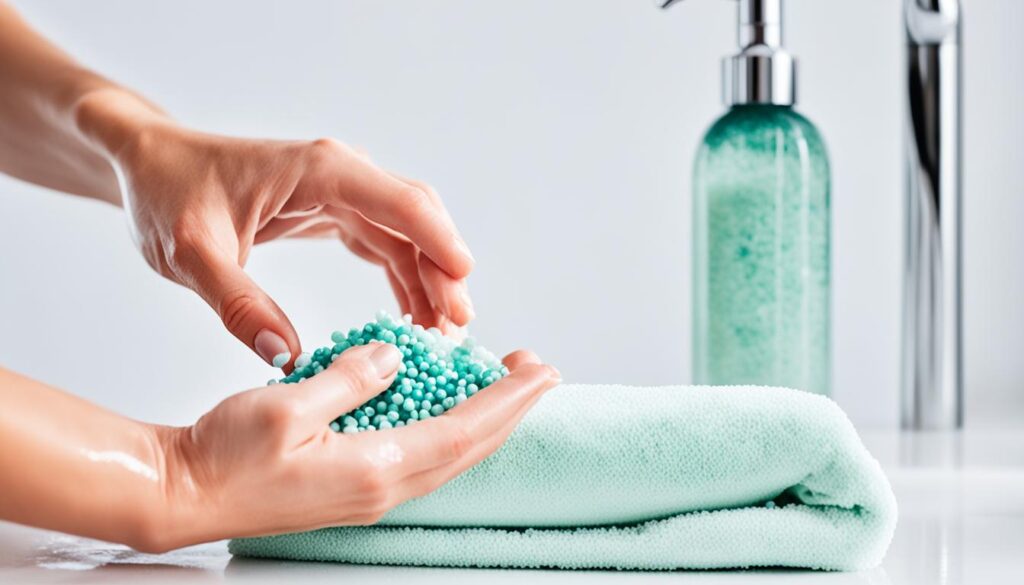
Exfoliating is a crucial step in your morning skincare routine that offers numerous benefits for your skin. By removing dead skin cells, exfoliation helps reveal a smoother and more radiant complexion. Let’s explore how exfoliating can enhance your morning skincare routine and improve the overall health of your skin.
One effective exfoliation method to consider is using gommages, which are gentle exfoliating products. Gommages are formulated to remove dead keratin fragments without relying on harsh chemicals or physical particles. This makes them suitable for those with sensitive skin, ensuring a gentle yet effective exfoliation process.
The main advantage of exfoliating in the morning is that it prepares your skin for the absorption of other skincare products. By removing dead skin cells, exfoliation allows serums and moisturizers to penetrate more deeply into the skin, maximizing their benefits. This means that the active ingredients in your subsequent skincare steps can work more effectively, providing optimal hydration and nourishment.
In addition to enhancing product absorption, exfoliating in the morning helps to even out your skin texture. Regular exfoliation can reduce the appearance of roughness, fine lines, and dry patches, resulting in a smoother and more even complexion. It also promotes healthy skin cell turnover, which supports a youthful and glowing appearance.
Using the right exfoliation technique and frequency is important for achieving the desired results without causing irritation or damage to your skin. It is recommended to exfoliate two to three times a week, depending on your skin type and tolerance. If you have sensitive or dry skin, exfoliating once a week may be sufficient. Be sure to follow the instructions provided with your exfoliating product and listen to your skin’s needs.
Remember, exfoliating is just one step in your comprehensive morning skincare routine. To create a well-rounded routine that addresses all your skincare needs, be sure to include cleansing, toning, serum application, moisturizing, and sunscreen. By following a consistent and personalized morning skincare routine, you can achieve healthier, glowing skin every day.
Key Benefits of Exfoliating in the Morning:
- Removes dead skin cells, revealing a smoother complexion
- Prepares the skin for better absorption of serums and moisturizers
- Improves skin texture, minimizing roughness and fine lines
- Supports healthy skin cell turnover for a radiant appearance
- Enhances the effectiveness of other skincare products in your routine
Now that you understand the benefits of exfoliating in the morning, let’s explore the role of toning in your morning skincare routine.
The Role of Toning in the Morning Routine
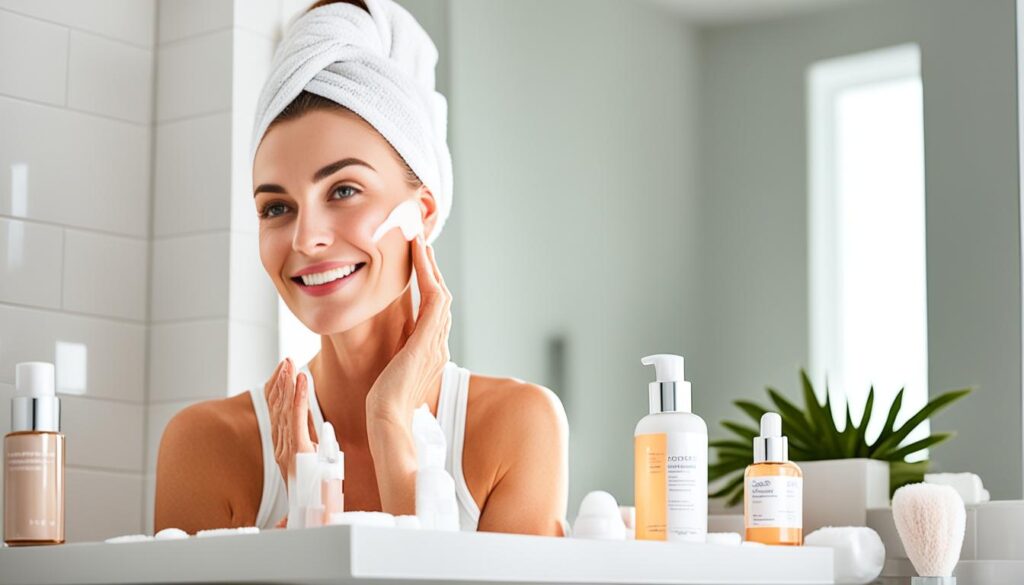
Toner is an optional but beneficial step in the morning skincare routine. It can help balance the pH of the skin and provide hydration. Toners with specific ingredients, such as hyaluronic acid or rose water, can be chosen based on your skin type and hydration needs.
To understand the importance of toning and how it fits into your morning skincare routine, let’s take a deeper look:
The pH Balance
The pH balance of your skin plays a crucial role in maintaining its overall health. Our skin has a protective barrier called the acid mantle, which acts as a defense against external irritants. The pH level of the acid mantle is slightly acidic, typically between 4.5 and 5.5. However, cleansing your face can disrupt this balance by making your skin more alkaline.
Using a toner after cleansing helps to restore your skin’s natural pH balance. Toners with gentle, slightly acidic formulas can help bring your skin’s pH back to its optimal range. This is important because when the skin’s pH is balanced, it can better retain moisture, keep out harmful bacteria, and is less prone to irritation.
Hydration Boost
Toners can also provide an extra layer of hydration to your skin. While cleansing and exfoliating are essential steps to remove impurities and dead skin cells, they can sometimes leave the skin feeling dry or stripped. Toners infused with hydrating ingredients like hyaluronic acid can help replenish moisture and keep your skin plump and supple.
Adding a toner that suits your skin’s hydration needs can lock in moisture and create a smoother canvas for the next steps in your morning skincare routine.
Toner is like a primer for your skin, preparing and priming it for better absorption of the following products.
By incorporating a toner into your morning skincare routine, you can effectively balance your skin’s pH levels and provide it with an extra dose of hydration. Remember to choose a toner that suits your skin type and keep in mind any specific hydration concerns you may have.
The Importance of Serums in the Morning

Morning serums play a vital role in your daily skincare routine, providing numerous benefits for your skin. In particular, serums with antioxidant properties, such as vitamin C, offer a range of advantages that can enhance the overall health and appearance of your skin.
Antioxidant serums, like those containing vitamin C, are highly effective in combatting free radicals, which are unstable molecules that contribute to skin damage and premature aging. By decreasing the presence of free radicals, these serums help minimize the appearance of fine lines and wrinkles, promoting a smoother, more youthful complexion.
Moreover, antioxidant serums improve the texture and tone of your skin, helping to create a more even and radiant appearance. They work by supporting collagen production, which is essential for maintaining firmness and elasticity in the skin.
One of the key advantages of morning serums is their ability to provide added hydration. Hydration is crucial for maintaining skin health and preventing dryness, which can lead to a dull and lackluster complexion. By incorporating a hydrating serum into your morning routine, you can ensure that your skin remains moisturized throughout the day, resulting in a plump and glowing appearance.
Additionally, serums enhance the effectiveness of other skincare products in your routine. Their lightweight and concentrated formulations allow for better absorption, allowing the active ingredients in subsequent products, such as moisturizers and sunscreens, to penetrate deeper into the skin.
To illustrate the benefits of incorporating serums into your morning skincare routine, take a look at the following table:
| Benefits of Morning Serums | Antioxidant Serum with Vitamin C | Hydrating Serum |
|---|---|---|
| Decreases free radicals | ✓ | – |
| Minimizes fine lines and wrinkles | ✓ | – |
| Improves texture and tone | ✓ | – |
| Provides hydration | – | ✓ |
| Enhances effectiveness of other products | ✓ | ✓ |
The Role of Moisturizing in the Morning
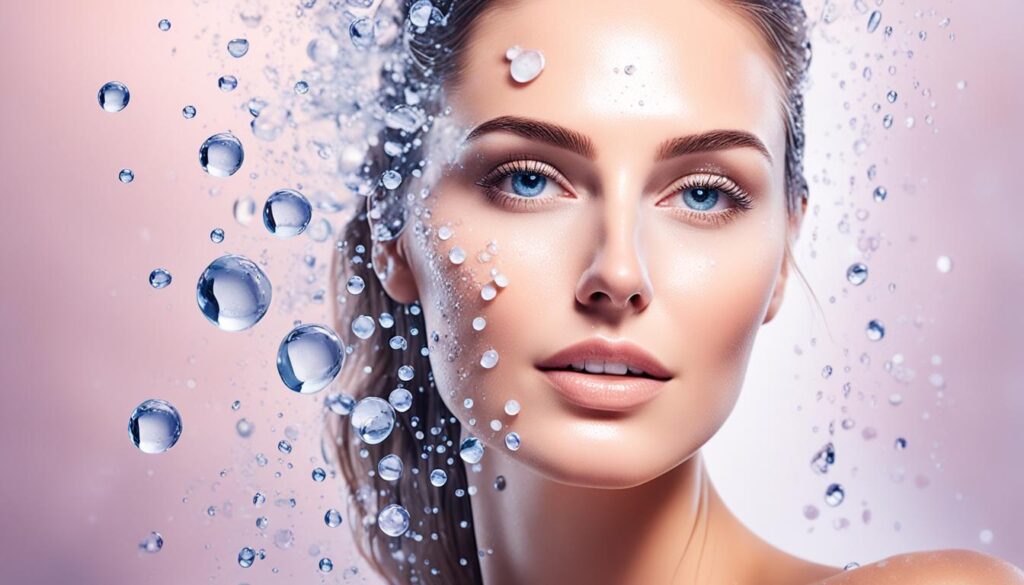
Moisturizing is an essential step in your morning skincare routine to maintain skin hydration and strengthen the skin barrier. By incorporating a moisturizer into your daily routine, you can effectively decrease dryness and promote a healthier complexion. Finding the right moisturizer for your skin type and concerns is important to achieve optimal results.
“Moisturizing is the key to achieving a well-hydrated and radiant complexion in the morning.”
The best moisturizer for you will depend on your specific needs. If you have dry skin, look for ingredients like ceramides, glycerin, or hyaluronic acid, as they provide intense hydration and help retain moisture throughout the day. These ingredients work by replenishing the skin’s natural barrier and preventing water loss.
For those with oily or acne-prone skin, it’s essential to choose oil-free or lightweight gel moisturizers. These formulations provide hydration without clogging pores or causing excessive oiliness. Look for products labeled as non-comedogenic and oil-free to ensure they won’t exacerbate acne or contribute to breakouts.
Moisturizing in the morning helps create a smooth canvas for makeup application and enhances the overall appearance of your skin. It also plays a crucial role in protecting your skin against environmental stressors and maintaining a healthy moisture balance throughout the day.
Tips for Effective Moisturizing in the Morning:
- Apply moisturizer to clean, dry skin after cleansing.
- Use gentle, upward strokes to massage the moisturizer into your skin.
- Allow the moisturizer to absorb fully before applying sunscreen or makeup.
- Choose a moisturizer with added sun protection to streamline your routine.
- Reapply moisturizer as needed to maintain hydration throughout the day.
By prioritizing moisturizing in your morning skincare routine, you can start the day with well-hydrated and nourished skin, ensuring a healthy and radiant complexion.
The Importance of Sunscreen in the Morning Routine

When it comes to your morning skincare routine, one step you should never skip is sunscreen. Protecting your skin from harmful UV rays is crucial for maintaining its health and preventing damage. Regardless of whether you spend your day indoors or outdoors, incorporating sunscreen into your morning routine is essential.
Using a sunscreen with at least SPF 30 provides effective sun protection. The higher the SPF, the better the defense against the sun’s harmful rays. Look for sunscreens that offer broad-spectrum coverage, shielding your skin from both UVA and UVB rays.
In addition to SPF, consider using sunscreens that contain ingredients like zinc oxide and titanium dioxide. These minerals provide physical protection by creating a barrier on the skin’s surface, reflecting and scattering the sun’s rays. This adds an extra layer of defense and reduces the risk of sunburn and long-term sun damage.
Applying sunscreen as the final step in your morning routine helps ensure that your skin is adequately shielded throughout the day. Remember to apply it generously to all exposed areas, including your face, neck, arms, and any other areas susceptible to sun exposure. Don’t forget to reapply every two hours or immediately after sweating or swimming.
By making sunscreen a non-negotiable part of your morning skincare routine, you prioritize not only the immediate protection of your skin but also its long-term health. Shielding your skin from the sun reduces the risk of sunburn, premature aging, and even skin cancer.
“The best sunscreen is the one you will use consistently.” – Dr. Ava Shamban
Customizing Your Morning Skincare Routine Based on Skin Type
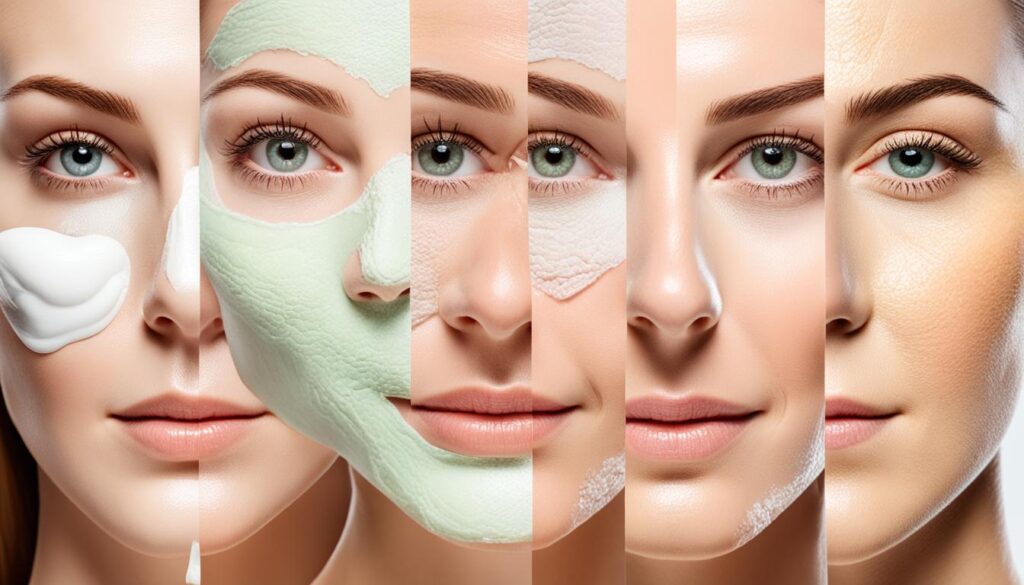
When it comes to your morning skincare routine, one size does not fit all. Customizing your routine based on your specific skin type is essential for achieving healthy, radiant skin. Different skin types have different needs and require different products to address their unique concerns. Whether you have dry, oily, or combination skin, finding the right products can make a significant difference in the appearance and overall health of your skin.
For dry skin:
Dry skin craves hydration and moisturization. Look for products that are rich in emollients, such as shea butter or hyaluronic acid, to replenish moisture and nourish the skin. Opt for a gentle, hydrating cleanser that won’t strip away natural oils. Follow up with a moisturizer that provides long-lasting hydration and helps restore the skin’s protective barrier. Sunscreen is also essential to protect dry skin from further moisture loss.
For oily skin:
Oily skin requires balancing excess oil production without stripping the skin. Choose a gentle, oil-free cleanser that helps control oil and removes impurities without over-drying the skin. Look for lightweight, non-comedogenic moisturizers that won’t clog pores. Incorporate a toner with ingredients like witch hazel or tea tree oil to help regulate oil production. Don’t forget to use a sunscreen that is oil-free and mattifying to prevent shine.
For combination skin:
Combination skin can be trickier to care for, as it varies in different areas of the face. Use a gentle cleanser that targets both oily and dry areas, balancing oil production without drying out the skin. Apply lightweight moisturizers to hydrate dry areas, focusing on oil-free formulas for the T-zone. Incorporate toners that balance and refine pores. Opt for an oil-free, broad-spectrum sunscreen to protect against sun damage.
Consulting with a dermatologist or skincare professional can provide valuable insights into your skin type and help you determine the best products and routine for your specific needs. By customizing your morning skincare routine based on your skin type, you can address your skin concerns effectively and achieve a healthier, more vibrant complexion.
The Role of Evening Skincare Routine
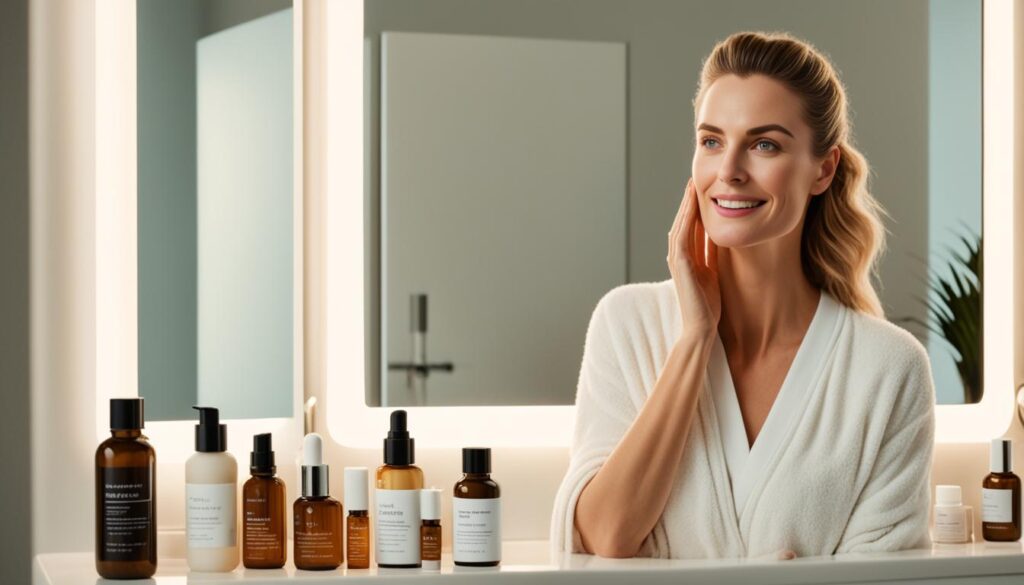
An evening skincare routine is crucial for maintaining healthy and radiant skin. It serves multiple purposes, including removing the dirt, oil, and pollutants that have accumulated on the skin throughout the day. Additionally, an evening skincare routine helps to replenish moisture and address specific skin concerns, promoting skin repair and cell turnover during the night.
The key steps in an evening skincare routine include:
- Cleansing: Begin by thoroughly cleansing your face to remove dirt, makeup, and impurities. Use a gentle cleanser that suits your skin type.
- Toning: After cleansing, apply a toner to balance the skin’s pH and prepare it for the next steps. Toners can also help remove any residual traces of cleanser.
- Applying Treatments or Serums: This step involves using targeted treatments or serums to address specific skin concerns. For example, you can incorporate a retinol serum to promote collagen production and reduce fine lines and wrinkles.
- Moisturizing: Apply a moisturizer to hydrate and nourish the skin. Choose a moisturizer that suits your skin type and has ingredients that address your specific concerns.
- Using Targeted Treatments: If you have specific skin concerns like acne or hyperpigmentation, you can incorporate targeted treatments into your evening routine. For example, products containing salicylic acid can help combat acne, while those with vitamin C can aid in brightening the skin.
By following an evening skincare routine, you allow your skin to repair itself overnight. During this time, the skin undergoes cellular renewal, and the application of targeted treatments can enhance this process. The routine also helps to replenish moisture, strengthen the skin’s barrier, and promote a more youthful appearance.
“An evening skincare routine is a vital part of maintaining healthy skin. It provides an opportunity to remove impurities, treat specific concerns, and support the skin’s natural repair processes during the night.” – Dr. Sarah Johnson, Dermatologist
| Benefits of Evening Skincare Routine | How It Helps |
|---|---|
| Promotes Skin Repair | Allows the skin to repair itself overnight and rejuvenate. |
| Enhances Cell Turnover | Facilitates the shedding of dead skin cells and promotes the growth of new, healthy cells. |
| Addresses Specific Concerns | Allows for targeted treatment of skin concerns such as acne, hyperpigmentation, or fine lines. |
| Replenishes Moisture | Restores hydration levels and strengthens the skin’s natural barrier. |
Customizing Your Evening Skincare Routine Based on Skin Concerns
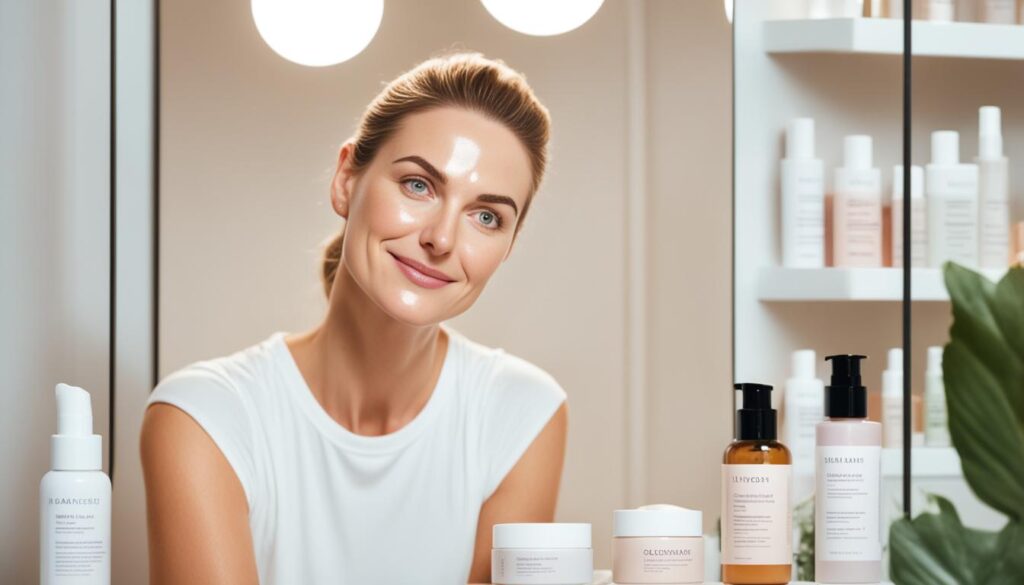
Your evening skincare routine is an opportune time to address specific skin concerns and tailor your regimen accordingly. Whether you struggle with acne, hyperpigmentation, or the appearance of fine lines, there are targeted treatments available to help you achieve your skincare goals. By incorporating serums or treatments with ingredients like benzoyl peroxide, hydroquinone, or retinol, you can effectively address and improve these specific skin concerns.
When it comes to acne-prone skin, benzoyl peroxide can be a powerful ingredient. It helps to reduce inflammation, unclog pores, and fight bacteria, ultimately diminishing the appearance and occurrence of breakouts. Hydroquinone, on the other hand, is a popular ingredient for treating hyperpigmentation. It works by inhibiting the production of melanin and fading dark spots over time. Lastly, retinol is a renowned anti-aging ingredient known for its ability to stimulate collagen production, reduce fine lines, and improve overall skin texture.
Remember to introduce these targeted treatments gradually into your evening skincare routine, applying them after cleansing and toning. Start with a lower concentration and gradually increase usage as your skin adjusts. Be sure to follow the recommendations of the specific product you are using, as some treatments may require limited exposure to direct sunlight or additional hydration.
By customizing your evening skincare routine to target your specific skin concerns, you can work towards achieving a healthier, more radiant complexion. Just remember to be consistent in your skincare regimen, giving your skin time to adapt and allowing the targeted treatments to work their magic overnight.
The Benefits of Targeted Treatments
Targeted treatments provide concentrated solutions to specific skin concerns, allowing you to address them more effectively. Incorporating these treatments into your evening skincare routine can help you achieve noticeable improvements in your skin’s appearance and texture. Here are a few key benefits of using targeted treatments:
- Improved acne management and reduction in breakouts.
- Reduction in the appearance of hyperpigmentation and dark spots.
- Refined skin texture and minimized fine lines.
- Enhanced collagen production for more youthful-looking skin.
Remember to consult with a skincare professional or dermatologist for personalized advice and recommendations tailored to your specific skin concerns. They can help you identify the best targeted treatments for your needs and guide you on how to incorporate them into your evening skincare routine effectively.
The Importance of Consistency in Skincare Routine
Consistency is key when it comes to your skincare routine. By using your skincare products regularly and following a consistent routine, you allow your skin to benefit from the active ingredients and achieve the desired results. Whether you’re aiming to improve your skin’s texture, reduce the appearance of fine lines, or address specific concerns, sticking to a consistent skincare routine is crucial.
When you use your skincare products consistently, it gives your skin the opportunity to adjust and adapt to the active ingredients. This is particularly important when incorporating new products into your routine. It takes time for your skin to respond and show visible improvements, so it’s important to be patient.
Results from a skincare routine don’t happen overnight. It may take several weeks or even months to see the full benefits of your consistent efforts. Remember, skincare is a long-term investment in the health and appearance of your skin.
Consistency is key when it comes to your skincare routine. By using your skincare products regularly and following a consistent routine, you allow your skin to benefit from the active ingredients and achieve the desired results.
Consistency in your skincare routine also helps maintain the health of your skin. By cleansing, exfoliating, toning, and moisturizing every day, you create a solid foundation for healthy skin. Regular use of effective skincare products can help balance your skin’s pH level, promote cell turnover, and protect your skin from environmental stressors.
Furthermore, consistency ensures that your skin receives continuous nourishment and protection. Daily application of sunscreen helps shield your skin from harmful UV rays, reducing the risk of sun damage and premature aging. By adhering to a skincare routine consistently, you create habits that promote long-lasting skin health.
Incorporating consistency into your skincare routine doesn’t have to be complicated. Start by establishing a morning and evening regimen that works for you and your skin type. Document your routine or create a checklist to keep track of the steps and products you use.
Additionally, finding skincare products that you enjoy using can make consistency easier. Look for products that align with your skin type and address your specific concerns. When you enjoy using your skincare products, it becomes a self-care ritual that you look forward to every day.
Remember, the key to achieving the best results from your skincare routine is consistency. Give your skin the time it needs to adjust, be patient, and stay committed to your daily regimen. With time, you’ll begin to see the improvements you desire, and your skin will thank you for the consistent care it receives.
Also Read: Skincare Routine For Problematic Skin Essentials
Conclusion
Creating a personalized morning skincare routine is crucial for preparing your skin for the day ahead and targeting specific skin concerns. By following a consistent skincare routine that includes cleansing, exfoliating, toning, applying serums, moisturizing, and using sunscreen, you can achieve a healthy and radiant complexion.
Your morning skincare routine should be tailored to your unique skin type and concerns. It’s important to choose products and techniques that work best for you, whether you have dry, oily, sensitive, or acne-prone skin. Consult with a dermatologist if needed to determine the most effective products for your skin.
Remember, consistency is key in maintaining the health and appearance of your skin. Stick to your personalized morning skincare routine and be patient as it may take time to see visible improvements. With dedication and the right products, you can enjoy the benefits of a well-rounded skincare routine and achieve optimal results.
FAQs
Q: What is the best order to apply skincare products in the morning?
A: The general rule is to start with a cleanser, followed by a toner, then apply a serum, followed by moisturizer, and finally sunscreen as the last step.
Q: Why is it important to use SPF in the morning skincare routine?
A: SPF helps protect your skin from harmful UV rays that can cause premature aging, wrinkles, and skin cancer. It is essential to apply sunscreen every morning, even on cloudy days.
Q: Should I use a separate eye cream in my morning skincare routine?
A: Yes, using an eye cream can help hydrate and reduce puffiness and dark circles around the delicate skin of the eye area.
Q: When is the best time to apply a face serum – morning or night?
A: Face serums are typically applied in the morning to provide antioxidants and target specific skincare concerns before layering moisturizer and sunscreen.
Q: How can I brighten my skin in the morning?
A: To brighten your skin in the morning, consider using a vitamin C serum followed by a moisturizer with brightening ingredients like niacinamide.
Q: What is the difference between a morning skincare routine and a nighttime skincare routine?
A: Morning skincare routines focus on protection and preparation for the day ahead, while nighttime routines focus on repair and rejuvenation while you sleep.
Q: Can I skip my morning skincare routine if I wash my face at night?
A: It is still important to follow your morning skincare routine even if you washed your face the night before, as it helps protect your skin from environmental stressors throughout the day.
Q: How can I create the perfect morning skincare routine for my skin type?
A: To create a personalized morning skincare routine, consider your skin type (dry, oily, combination) and choose products that address your specific concerns, such as hydrating for dry skin or mattifying for oily skin.





